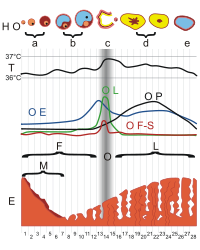
Photo from wikipedia
The study aimed to compare the effectiveness of conservative methods [Levonorgestrel (C21H28O2) � releasing intrauterine system (52 mg), endometrial ablation, hysteroscopy] vs. hysterectomy in perimenopausal bleeding. The study population was… Click to show full abstract
The study aimed to compare the effectiveness of conservative methods [Levonorgestrel (C21H28O2) � releasing intrauterine system (52 mg), endometrial ablation, hysteroscopy] vs. hysterectomy in perimenopausal bleeding. The study population was represented by 270 women addressed to Genesiun Clinic between 2010-2018 for perimenopausal bleeding because of different pathological circumstances: endometrial hypertrophy, polyps, uterine fibroids, endocervical lesions, chronic endometritis, intrauterine device (IUD)-related pathology, congenital abnormalities. The hysteroscopy is considered the method of choice in the diagnosis/therapeutic management of hemorrhagic metropathy. The hysteroscopic surgery was superior to hysterectomy, taking into account the postoperative complications and recovery, resumption of sexual activity and working. Levonorgestrel-releasing IUS 52 mg proved safe and efficient in treating metrorrhagia associated with endometrial dysplasia, uterine fibroids, and polyps. The bipolar electrosurgical VERSAPOINT system demonstrated good results in the treatment of intrauterine pathology. Our results pointed out the alternative of a surgery a few months after the hysteroscopy and endometrial ablation, and also the possibility of repeating the hysteroscopy procedure after a while, in some cases.
Journal Title: Revista de Chimie
Year Published: 2019
Link to full text (if available)
Share on Social Media: Sign Up to like & get
recommendations!